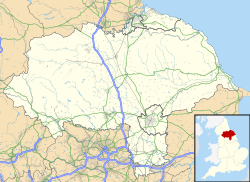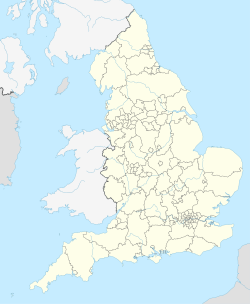| Studley Royal | |
|---|---|
 The landscape garden from "Surprise View" | |
| Type | Deer park and landscape garden |
| Location | North Yorkshire, England |
| Coordinates | 54°06′58″N 1°34′23″W / 54.11611°N 1.57306°W |
| Website | Fountains Abbey and Studley Royal Water Garden |
| Type | Cultural |
| Criteria | i, iv |
| Designated | 1986 (10th session) |
| Reference no. | 372 |
| Region | Europe and North America |
| Official name | Studley Royal |
| Type | Grade I |
| Designated | 10 May 1984 |
| Reference no. | 1000410[1] |
Studley Royal Park is an estate in North Yorkshire, England. The site has an area of 800 acres (323 ha)[2] and includes an 18th-century landscaped garden; the ruins of Fountains Abbey; Fountains Hall, a Jacobean mansion; and the Victorian St Mary's church, designed by William Burges. Studley Royal House, around which the park and gardens were designed, burned down in 1946. The park, as Studley Royal Park including the ruins of Fountains Abbey, has been designated a World Heritage Site. It has also been designated a grade I listed park and garden by Historic England, and various structures within it are individually listed.
After the Dissolution of the Monasteries, the Fountains estate was owned by the Gresham, Proctor, and Messenger families. At the same time, the adjacent Studley estate was separately held by the Mallorie (or Mallory) and then Aislabie families, after the marriage of Mary Mallory and George Aislabie. The estates were combined on 22 December 1767, when William Aislabie purchased the Fountains estate from John Messenger. In 1966, the property came into public ownership after its purchase by West Riding County Council. In 1983, it was acquired by the National Trust.
The gardens and park reflect every stage in the evolution of English garden fashion, from the late 17th century to the 1780s and beyond. Most unusually, both John and William embraced new garden fashions by extending their designed landscape rather than replacing and remaking outmoded parts. As a result, the cumulative whole is a catalogue of significant landscaping styles.
- ^ Historic England. "Studley Royal (1000410)". National Heritage List for England. Retrieved 7 October 2024.
- ^ "National Trust Fountains Abbey and Studley Royal Water Garden". National Trust. Retrieved 20 April 2012.

